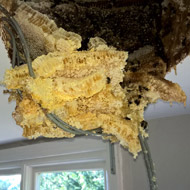
Hundreds of bees found in listed building
An enormous bee hive has been removed from a loft after a couple spotted honey dripping through their bathroom ceiling.
The hive was found in a grade II listed 18th Century house in Leicestershire earlier this month.
The couple told BBC News that they found the “sticky substance” coming through a light fixture. But it was not until heritage insurer Ecclesiastical cut a hole in the ceiling that they made the “surprising” discovery.
“The couple noticed a patch [and] on closer inspection they could see that the substance was sticky and coming through the light fixtures, said an Ecclesiastical spokesperson. "They [also] noticed a lot of bees around the house and at this point sought an expert view. The bee expert made a hole in the ceiling and discovered the huge hive."
The insurer added that because of the amount of honey, the claim had to be made in a similar way to water damage. After the busy bees and their honeycomb were removed, the ceiling and light fixtures were repaired.
David Bonehill, claims director at Ecclesiastical said: "Claims for this type of damage in older properties are relatively common. Usually leaking pipework is the cause rather than honey!"
Image (C) Ecclesiastical



 The Veterinary Medicines Directorate (VMD) is inviting applications from veterinary students to attend a one-week extramural studies (EMS) placement in July 2026.
The Veterinary Medicines Directorate (VMD) is inviting applications from veterinary students to attend a one-week extramural studies (EMS) placement in July 2026.